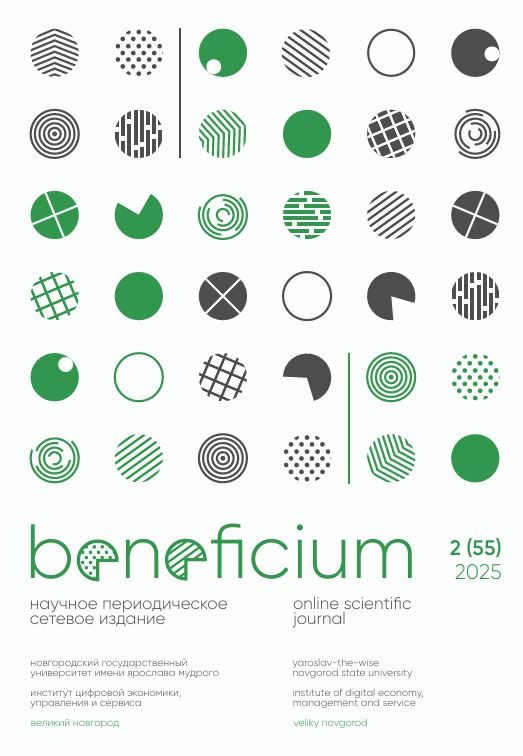СОЦИАЛЬНЫЕ ИНВЕСТИЦИИ БИЗНЕСА В РАЗВИТИЕ ТЕРРИТОРИЙ: СТРАТЕГИЯ КОНКУРЕНЦИИ ЗА ТРУДОВЫЕ РЕСУРСЫ
Аннотация
Конкуренция за персонал в современных условиях все чаще выходит за пределы индивидуальных компаний, становясь территориальной. В этом контексте среда жизни в регионе играет ключевую роль в привлечении и удержании кадров. Компании, которые инвестируют в развитие социальной инфраструктуры, образовательные программы и улучшение качества жизни в своих регионах, получают значительные конкурентные преимущества на рынке труда. В статье проведен анализ успешных примеров трансформации городской среды с участием бизнеса на основе данных программы «Бизнес и территории», реализованной Центром социального проектирования «Платформа». Исследование охватывает города с выраженным промышленным потенциалом, опираясь на экспертный опрос и статистические данные региональных органов власти за 2021-2024 годы. Рассмотрены мотивы бизнеса к участию в трансформации городов, включая снижение зависимости от одного источника ресурсов, укрепление социального бренда и конкуренцию за кадры. В рамках анализа данных 2021-2024 гг., проводившегося в различных индустриальных регионах России, таких как Татарстан и Красноярский край, выявлено, что бизнес начинает восприниматься как ключевой фактор стабильности региона. Компании, такие как «Газпром», «ЛУКОЙЛ», «Сибур» и «Росатом», активно инвестируют в социальные проекты, направленные на улучшение условий жизни. Эти инвестиции включают строительство жилья, улучшение инфраструктуры здравоохранения и поддержку образовательных программ. Авторами также исследованы основные проблемы и ограничения существующих рейтингов социального развития территорий, предложены альтернативные подходы к оценке вклада компаний в развитие городской среды. На основе анализа данных разработаны рекомендации по оптимизации социально-инвестиционных стратегий компаний для поддержки городских программ и комплексного развития территорий.
Ключевые слова: бизнес, город, компетенции, муниципальное образование, персонал, территориальное развитие, трудовые ресурсы, устойчивое развитие
Библиография
- Transforming our World: the 2030 Agenda for Sustainable Development (2025). United Nations. (На англ.). URL: https://sdgs.un.org/2030agenda (дата обращения 18.02.2025).
- Scott A.J., Storper M. The Nature of Cities: The Scope and Limits of Urban Theory // International Journal of Urban and Regional Research. Vol. 39(1). Pp. 1-37. (На англ.). DOI: 10.1111/1468-2427.12134
- Geels F.W. Disruption and Low-Carbon System Transformation: Progress and New Challenges in Socio-Technical Transitions Research and the Multi-Level Perspective // Energy Research & Social Science. 2017. Vol. 37. Pp. 224-231. (На англ.). DOI: 10.1016/j.erss.2017.10.010
- IESE Cities in Motion Index (2020). ICT. (На англ.). URL: https://ict.moscow/static/56c3d4ef-c3fa-5e0d-8422-528244fd8b9d.pdf (дата обращения 18.01.2025).
- Smart cities: Digital solutions for a more livable future (2018). McKinsey & Company. (На англ.). URL: https://www.mckinsey.com/~/media/McKinsey/Industries/Public%20and%20Social
%20Sector/Our%20Insights/Smart%20cities%20Digital%20solutions%20for%20a%
20more%20livable%20future/MGI-Smart-Cities-Full-Report.pdf (дата обращения 20.01.2025). - Krugman P. Geography and Trade. Publisher: Leuven, Belgium, Cambridge, Mass, 1991. 142 p. (На англ.).
- Nelson R.R., Winter S.G. An Evolutionary Theory of Economic Change. Publisher: Belknap Press of Harvard University Press, 1982. 452 p. (На англ.).
- Ahmed S., Arif Shah M. Wakil K. Blockchain as a Trust Builder in the Smart City Domain: A Systematic Literature Review // IEEE Access. 2020. Vol. 8. Pp. 92977-92985. (На англ.). DOI: 10.1109/ACCESS.2020.2993724
- Duygan M., Fischer M., Pärli R., Ingold K. Where Do Smart Cities Grow? The Spatial and Socio-Economic Configurations of Smart City Development // Sustainable Cities and Society. Vol. 77. Pp. 1-12. (На англ.). DOI: 10.1016/j.scs.2021.103578
- Митрофанова И.В., Пьянкова С.Г., Ергунова О.Т. Цифровизация муниципальной экономики: глобальные тренды и практика российских муниципалитетов // Общество: политика, экономика, право. 2020. № 10(87). С. 48-55. DOI: 24158/pep.2020.10.7
- Фирсов А. Смысл – это ключевой продукт (2020). Платформа. URL: https://pltf.ru/2020/12/20/istoriya/ (дата обращения 20.01.2025).
- World Urbanisation Prospects (2018). United Nations. (На англ.). URL: https://population.un.org/wup/ (дата обращения 20.01.2025).
- International Migration Outlook 2021: The Fiscal Impact of Immigration in OECD Countries since the Mid-2000. Paris: OECD Publishing, 2021. 442 p. (На англ.). DOI: 10.1787/29f23e9d-en
- Russia: Degree of urbanization from 2013 to 2023 (2025). Statista. (На англ.). URL: https://www.statista.com/statistics/271343/urbanization-in-russia/ (дата обращения 25.01.2025).
- Годовой отчет 2023 (2024). ВЭБ РФ. URL: https://veb.ru/investoram/otchetnost/godovoj-otchet-2023/ (дата обращения 25.01.2025).
- Esashika D., Masiero G., Mauger Y. Living Labs Contributions to Smart Cities from a Quadruple-Helix Perspective // Journal of Science Communication. 2023. Vol. 22(03). Pp. 1-20. (На англ.). DOI: 10.22323/2.22030202
- Цибарева М.Е., Васяйчева В.А. Оценка эффективности внедрения элементов «умного города» в процессе цифровизации городской среды // Вестник Самарского университета. Экономика и управление. 2020. Том 11. № 2. С. 83-91. DOI: 10.18287/2542-046 1-2020-11-2-83-91
- Логиновский О.В., Шестаков А.Л., Голлай А.В. Формирование стратегии развития умных городов субъекта РФ // Вестник ЮУрГУ. Серия: «Компьютерные технологии, управление, радиоэлектроника». 2020. Том 20. № 2. С. 77-92. DOI: 10.14529/ctcr200208
- Boschma R., Martin R. The handbook of evolutionary economic geography. Publisher: Edward Elgar Publishing, 2010. 570 p. (Наангл.).
- Чечулин А.В., Шелонаев С.И., Сметанина Т.В. «Умный город»: концепт и опыт государственного управления в России // Известия СПбГЭУ. 2021. № 5(131). С. 60-65.
- Регионы России. Социально-экономические показатели. 2023. Статистический сборник. М.: Росстат, 2023. 1128 с.
- Рейтинг лучших городов для бизнеса (2024). Forbes. URL: https://www.forbes.ru/ratings/best-cities (дата обращения 20.02.2025).
Информация об авторах
Алексей Владимирович Фирсов – генеральный директор, ЦСП «Платформа», Москва, Россия. E-mail: firsov@pltf.ru. ORCID 0009-0008-8573-6071
Наталия Юрьевна Белякова – канд. экон. наук; доцент, Национальный исследовательский университет Высшая школа экономики, Москва, Россия. E-mail: nataliabelyakova@mail.ru. SPIN РИНЦ 5639-6347. ORCID 0000-0001-6605-8211. ResearcherID D-9884-2018. Scopus Author ID 57130615100
Ольга Титовна Ергунова – канд. экон. наук, доцент; доцент, Санкт-Петербургский политехнический университет Петра Великого, Санкт-Петербург, Россия. E-mail: ergunova-olga@yandex.ru. SPIN РИНЦ 5254-7764. ORCID 0000-0002-1714-7784. ResearcherID Е 8582-2017. Scopus Author ID 57193734749
Наталья Юрьевна Омарова – д-р экон. наук, профессор; профессор, Новгородский государственный университет имени Ярослава Мудрого, Великий Новгород, Россия. E-mail: natalya.omarova@novsu.ru. SPIN РИНЦ 6750-4452. ORCID 0000-0003-0678-4590. Scopus Author ID 57190431350
Для цитирования: Фирсов А.В., Белякова Н.Ю., Ергунова О.Т., Омарова Н.Ю. Социальные инвестиции бизнеса в развитие территорий: стратегия конкуренции за трудовые ресурсы // BENEFICIUM. 2025. № 2(55). С. 131-141. DOI: 10.34680/BENEFICIUM.2025.2(55).131-141









